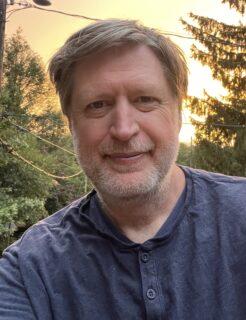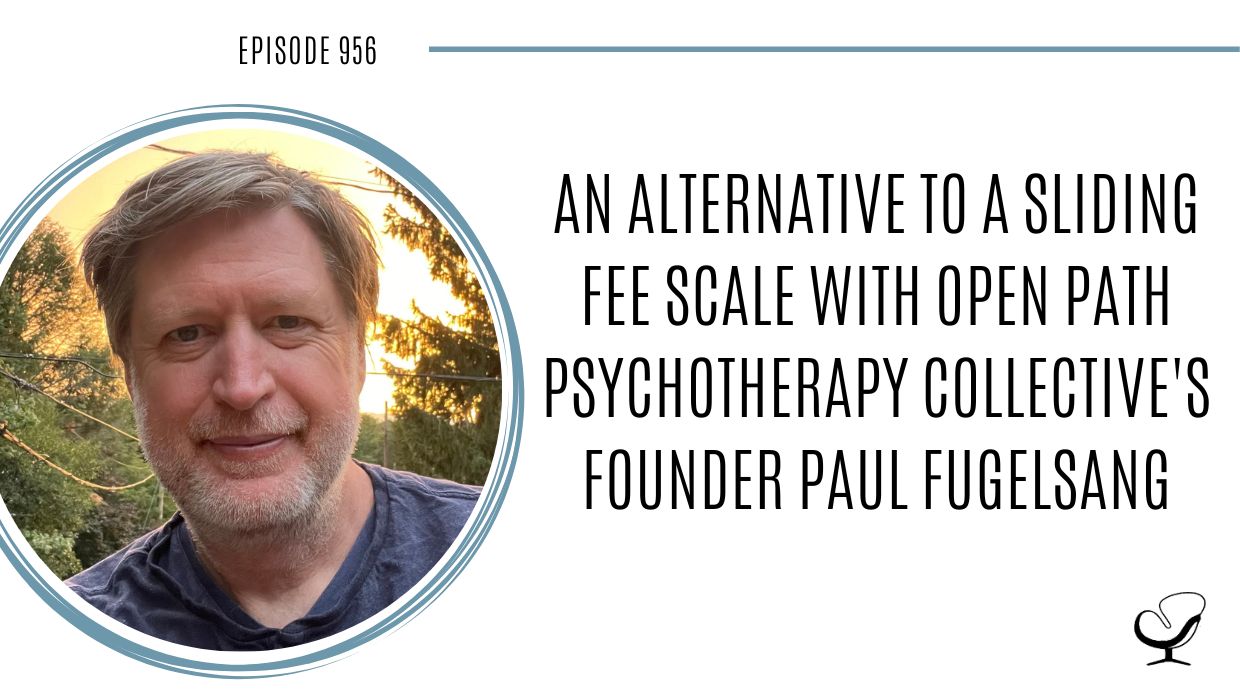Podcast: Play in new window | Download | Embed
Do you want to serve your community without having to risk your financial security? Has your ideal client group been struggling to afford therapy? Have you heard of the Open Path Collective?
In this podcast episode, Joe Sanok speaks about an alternative to a sliding fee scale with Open Path Psychotherapy Collective’s founder Paul Fugelsang.
Podcast Sponsor: Alma

Going in-network with insurance can be tough. Filing all of the right paperwork is time-consuming and tedious, and even after you’re done, it can take months to get credentialed and start seeing clients.
That’s why Alma makes it easy and financially rewarding to accept insurance. When you join their insurance program, you can get credentialed within 45 days, and access enhanced reimbursement rates with major payers. They also handle all of the paperwork, from eligibility checks to claims submissions, and guarantee payment within two weeks of each appointment.
Once you’ve joined Alma’s insurance program, you can see clients in your state of licensure regardless of where you’re working from.
Learn more about building a thriving private practice with Alma at helloalma.com/joe
Meet Paul Fugelsang

Paul has worked in the mental health field since 1996 with a focus on projects committed to improving mental health services for lower-income individuals and families. Before beginning his own private psychotherapy practice, he spent five years as a counselor and supervisor at Esperanza, NY, a community-based agency designed to implement procedural reform throughout the juvenile justice system in New York City. A graduate of Naropa University’s Contemplative Psychotherapy program, Paul operates the Open Path Psychotherapy Collective and resides in Asheville, NC.
Visit Open Path and connect on Instagram.
In this Podcast
- Building Open Path from the ground up
- Obtaining a Google Grant
- The client’s experience with Open Path
- The Future of Open Path
- Paul’s advice to private practitioners
Building Open Path from the ground up
Once Paul had the idea down when he noticed the need for more affordable therapy, he knew that he had to raise some money from the onset to make it happen.
Paul figured out that he needed about $20,000 to get it going, but he didn’t have any money and didn’t have a wealthy family to lend money from. So, he set up a go-fund-me and managed to raise $17,000 from friends and their connections.
Paul and his team then began setting up the foundations of the business, the website, and the systems and began working with mental health practitioners.
We started talking up the idea to therapists and [they] liked the idea. This was before therapists were really being beseeched by all these therapy companies asking for their attention … We were one of the first [organizations] to do this sort of thing. So they liked the idea, they liked that we were a non-profit organization, and therapists started signing up! (Paul Fugelsang)
Even though Open Path was accumulating in success, Paul knew that they couldn’t rely solely on word-of-mouth marketing and that they had to develop a strategic marketing plan to maintain the momentum of their success.
Obtaining a Google Grant
Google offers grants for non-profit organizations in the form of ad-words money, the little ads at the top of the page for Google searches.
They will give you $10,000 a month … It’s a kind of donation where they’re handing you credits … That was a huge boon for us to find clients in the early days. (Paul Fugelsang)
Nowadays, the grant has changed structure and amounts, so you need to check on the specifics if you are interested in applying for one as well.
The client experience of Open Path
The client experience is made to be as easy as possible for new clients to find a great therapist to work with.
They go to the website and put their zip code in to see all the available therapists in their area and also within their state. They can then click on a therapist profile and a “join” button with a brief application.
The moment they hit “submit” they’re asked to pay the $65 fee which is a lifetime membership fee … Then an email is sent to the therapist about the client, and it invites them to connect and start the therapeutic relationship. (Paul Fugelsang)
Once there has been a connection between a therapist and the client, Open Path backs out of the equation entirely and leaves them to the therapeutic process and relationship.
They essentially and simply connect the need with the service, and leave the rest up to the therapist and the client – unless there is an issue to be solved, which rarely happens.
The future of Open Path
Maintaining a successful business is about knowing when to push forward to grow and when to just maintain the momentum to allow the new success to settle.
For Open Path, Paul and his team and in the middle of that balance.
The reality is that for many non-profit organizations, there is a nuance in finances since you need to keep the business running but the usual business structures might not apply to your model.
I have issues with capitalism but I also don’t see it as a black and white thing that’s either good or bad. What I recognize is that capitalism is a very powerful, seductive force in our experiences right now and how we live our lives, and what we have to do at Open Path is to be conscious of this force because we don’t want to fall sway to it. (Paul Fugelsang)
The team at Open Path wants to maintain its non-profit model while making sure that it is financially successful enough so that it can continue to grow and serve the needs it currently provides.
We have to be careful that we don’t fall to the sway of [capitalism] where it’s like this growth mentality where all we have to do and all we can do is to keep working towards growth … I think that what we try to do is to look at what we have in front of us, look at what the field is ahead of us, and try to respond to that in a way that is as continuous and thoughtful as possible. (Paul Fugelsang)
Paul’s advice to private practitioners
It’s a tremendous gift to be a therapist, and a privilege to share a healing and transformative journey based on trust and respect with a client. It’s a wonderful thing, so remember that, and don’t take the work that you do for granted!
Sponsors Mentioned in this episode:
- Sign Up to Level Up Week!
- Learn more about building a thriving private practice with Alma at helloalma.com/joe
Useful links mentioned in this episode:
- Visit Open Path and connect on Instagram.
-
Email Joe at [email protected] to suggest guests for the show
Check out these additional resources:
Kim Ades is Leading Leaders | POP 955
Events – click on the event’s dropdown
Sign up to join the free webinars and events here
Practice of the Practice Podcast Network
Free resources to help you start, grow, and scale
Apply to work with us — a decision-making matrix for your next steps
Meet Joe Sanok

Joe Sanok helps counselors to create thriving practices that are the envy of other counselors. He has helped counselors to grow their businesses by 50-500% and is proud of all the private practice owners who are growing their income, influence, and impact on the world. Click here to explore consulting with Joe.
Thanks For Listening!
Feel free to leave a comment below or share the social media below!

